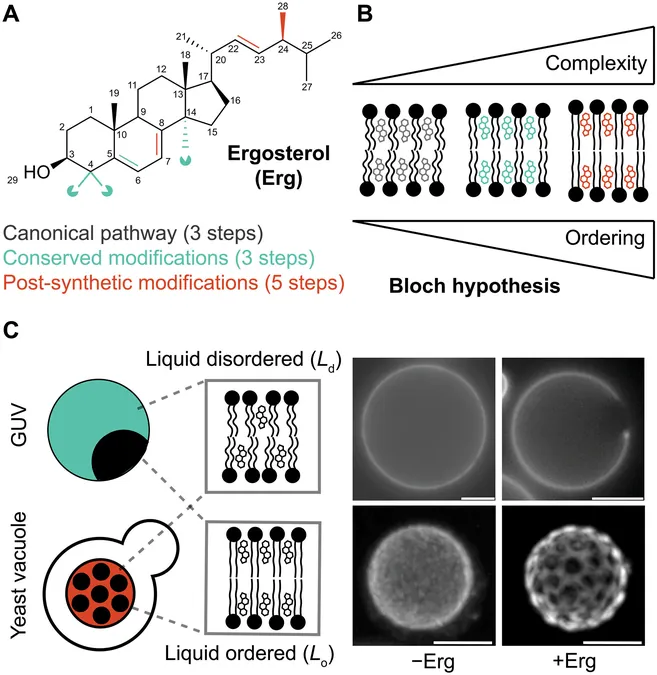
Unlocking the Secrets of Sterol Synthesis: How Cells Master Lipid Balance
2025-05-15
Author: Daniel
The Vital Role of Sterols in Eukaryotic Cells
Sterols, including the well-known cholesterol in humans and ergosterol in yeast, are crucial lipids that play a major role in the functioning of eukaryotic cells. However, the creation of these compounds involves intricate and lengthy metabolic pathways that have puzzled scientists for years.
Groundbreaking Research by UC San Diego and NIH
A pioneering team of researchers from UC San Diego and the National Institutes of Health (NIH) has employed a groundbreaking mix of cell biology, in vitro biochemistry, and advanced molecular simulations to uncover the hidden mechanics of ergosterol synthesis in yeast. Their findings reveal how this metabolic pathway carefully modulates ergosterol's interactions with other lipids, facilitating the formation of specialized membrane domains.
These membrane domains are critical as they organize proteins within cell membranes, impacting numerous cellular functions.
Revisiting a 50-Year-Old Hypothesis
The team’s work also reexamines the long-standing Bloch hypothesis, a model established over half a century ago to explain the evolution of sterol metabolism in eukaryotic cells. Their results suggest that the elaborate nature of sterol metabolism may have evolved as a necessity to maintain proper lipid interactions for effective membrane organization.
A Journey into the World of Sterols
Assistant Professor of Chemistry and Biochemistry, Itay Budin, expressed enthusiasm for the project, stating, "This has been one of my favorite projects. It taught me so much about sterols, their metabolism, and the hoops cells go through to make their lipids dance in just the right way." This sentiment underscores the complexity and significance of lipid management in cellular life.
What This Means for Future Research
The implications of this research extend beyond yeast cells, potentially shaping our understanding of lipid metabolism in various eukaryotes, including humans. As researchers continue to unravel the complexities of sterol synthesis, we may uncover new insights into how these vital lipids contribute to health and disease, paving the way for innovative therapeutic strategies.

 Brasil (PT)
Brasil (PT)
 Canada (EN)
Canada (EN)
 Chile (ES)
Chile (ES)
 Česko (CS)
Česko (CS)
 대한민국 (KO)
대한민국 (KO)
 España (ES)
España (ES)
 France (FR)
France (FR)
 Hong Kong (EN)
Hong Kong (EN)
 Italia (IT)
Italia (IT)
 日本 (JA)
日本 (JA)
 Magyarország (HU)
Magyarország (HU)
 Norge (NO)
Norge (NO)
 Polska (PL)
Polska (PL)
 Schweiz (DE)
Schweiz (DE)
 Singapore (EN)
Singapore (EN)
 Sverige (SV)
Sverige (SV)
 Suomi (FI)
Suomi (FI)
 Türkiye (TR)
Türkiye (TR)
 الإمارات العربية المتحدة (AR)
الإمارات العربية المتحدة (AR)